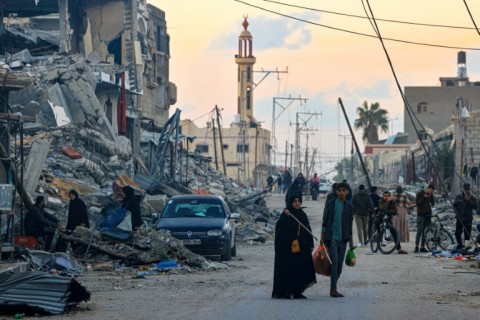TEL AVIV - Israel announced a resumption of combat in Gaza on Friday, carrying out a series of airstrikes across the territory, as a truce expired with no agreement to extend it.
"Hamas violated the operational pause, and in addition, fired toward Israeli territory," the Israeli military said.
"The IDF (Israel Defense Forces) has resumed combat against the Hamas terrorist organisation in the Gaza Strip."
It said fighter jets were "currently striking Hamas terror targets" in Gaza, and AFP journalists reported airstrikes in the north and south of the territory.
The Hamas-run health ministry said strikes killed three people in southern Gaza's Rafah, where many Palestinians fled after being told by Israel to leave the north of the territory.
A source close to Hamas told AFP that the group's armed wing had received "the order to resume combat" and to "defend the Gaza Strip," with heavy fighting reported in parts of Gaza City.
The fighting resumed shortly after Israel's military said it had intercepted a rocket fired from Gaza, the first from the territory since a missile launched minutes into the start of the truce.
Sirens warning of potential missile fire sounded around several communities near Gaza in the hour after the fighting resumed, and Israeli authorities said they were restarting security measures in the area including closing schools.
The renewed conflict dashed hopes for an extension of a seven-day truce during which dozens of hostages were freed in exchange for Palestinian prisoners, and more aid entered the ravaged Gaza Strip.
On Thursday, US top diplomat Antony Blinken, meeting Israeli and Palestinian officials, called for the pause in hostilities to be extended, and warned any resumption of combat must protect Palestinian civilians.
The truce had paused fighting that began on October 7 when Hamas militants broke through Gaza's militarised border into Israel.
The surprise attack killed 1,200 people, mostly civilians, and militants kidnapped about 240, according to Israeli authorities.
Israel vowed to eliminate Hamas in response and unleashed an air and ground military campaign in Gaza that the Hamas government says has killed more than 15,000 people, also mostly civilians.
- 'Coming back' -
During the truce brokered by Qatar, 80 Israeli hostages were freed in exchange for 240 Palestinian prisoners.

More than 20 foreigners, most of them Thais living in Israel, were freed outside the scope of the agreement.
Overnight, six more Israelis, some holding dual nationality, were released, hours after two women were freed.
That brought the total freed Thursday to eight, less than the 10 hostages a day the truce deal required Hamas to release. A source close to the militant group said it was counting two Russian-Israeli women released on Wednesday as part of the seventh batch.
The release brought relief for Keren Shem, whose daughter Mia was among those freed. The family released footage showing Keren weeping with joy as she was informed by phone of her daughter's imminent freedom.
"Mia is coming back," she cried out.
Not long after the hostages arrived in Israel, the country's prison service said another 30 Palestinian prisoners -- 23 minors and seven women -- had been freed.
- Fears for civilians -
After meeting leaders in Israel and the occupied West Bank, Blinken said Washington wants "to see this process continue to move forward."
"We want an eighth day and beyond."
A source close to Hamas said the group backed another extension and mediators were working to prolong the pause, but the negotiations appeared to have failed.

But Israel made it clear it viewed the truce as a temporary pause to secure the release of hostages.
"We swore... to eliminate Hamas, and nothing will stop us," Israeli Prime Minister Benjamin Netanyahu said in a video released by his office, after meeting with Blinken.
His government has come under increasing pressure, however, to account for how it will protect civilians in the territory, which is under blockade, with no way for people to escape.
Blinken warned that any resumed military operation by Israel "must put in place humanitarian civilian protection plans that minimise further casualties of innocent Palestinians".
Specifically, Israel must "clearly and precisely" designate areas "in southern and central Gaza, where they can be safe and out of the line of fire", he said.
International bodies have called for more time to get medical supplies, food and fuel into Gaza, where an estimated 1.7 million people have been forced from their homes.

The truce had allowed people to return to the ruins of their homes to pick through the rubble for remaining belongings and provided a sense of safety after weeks of daily bombardment.
"We are afraid that the truce will end, so the problems and the bombings will start again," Gaza City resident Mohamad Naasan told AFP on Thursday.
"I hope that the truce resumes... so peace prevails, and we all go back home."
The violence in Gaza has also raised tensions in the West Bank, where nearly 240 Palestinians have been killed by Israeli soldiers or settlers since October 7, according to the Ramallah-based Palestinian health ministry.
- Report: Israel had intelligence on attack -

The New York Times reported overnight that Israeli authorities were aware Hamas was planning a major assault, and had obtained a blueprint for the attack, which the group appears to have largely followed on October 7.
Intelligence and military officials dismissed the plan as aspirational, even after a signals analyst warned the group had carried out a training exercise in line with the plan, according to the report.
burs-sah/

